Chapter: Essentials of Psychiatry: Clinical Evaluation and Treatment Planning: A Multimodal Approach
Laboratory Assessments
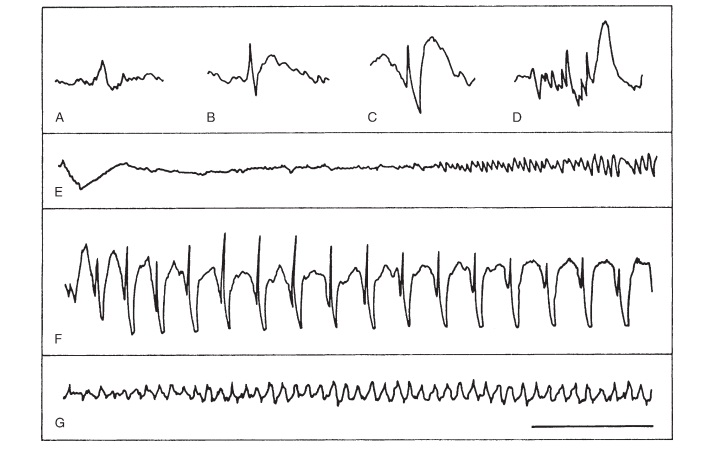
Laboratory Assessments
A variety of laboratory tests can aid in the
clinical evaluation of the psychiatric patient (Table 19.13). (Councilon
Scientific Affairs, 1987; Gold and Dackis, 1986).
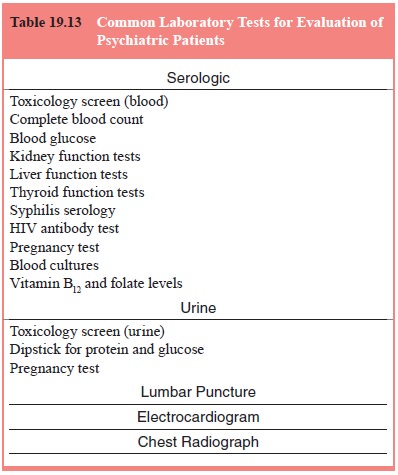
Serological Evaluations
Blood tests are particularly helpful in ruling out
medical causes of psychiatric symptoms.
Toxicology
When the clinician suspects that the ingestion of a
substance has caused the presenting symptoms, a urine toxicology screen and
blood alcohol level determination (Table 19.14) are indicated. (It is important
to remember that an alcohol level of zero may indi-cate that the symptoms are
due to a withdrawal syndrome and thus does not rule out alcohol as an inciting
factor.) If the patient is known to be taking certain psychiatric medications,
such as lithium, tricyclic antidepressants and anticonvulsants, levels of these
medications should be tested as toxic levels may cause a variety of psychiatric
symptoms.
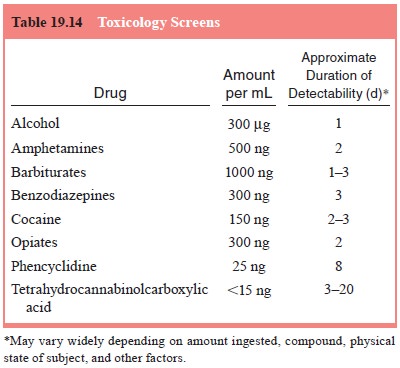
Complete Blood Count
The complete blood count is part of the general
laboratory eval-uation of a new patient. It is used to screen for multiple
prob-lems, most commonly infections and anemia. In cases in which alcoholism is
suspected or the mean corpuscular volume indi-cates a macrocytic anemia,
vitamin B12 and folate levels should be tested. Vitamin B12
deficiency may lead to combined system disease, which can present with
psychiatric symptoms such as irritability and forgetfulness in the early stages
and dementia or frank psychosis in the later stages. The complete blood count
is routinely used to monitor white blood cell counts in patients taking
clozapine. Additional emergency complete blood counts may be necessary if such
a patient develops fever, malaise, or other symptoms of infection. Certain mood
stabilizers, such as carbamazepine and divalproex sodium, can induce a variety
of blood dyscrasias.
Blood Glucose
The blood glucose test is an inexpensive, essential
test in the evaluation of patients with a new onset of central nervous system
dysfunction, psychosis, affective disorders and anxiety disor-ders. Hypoglycemia
may produce lethargy and vegetative symp-toms that may mimic those of
depression, and hyperglycemia may produce anxiety and delirium. This test is
clearly indicated for known diabetics who present with the first onset of
psychiat-ric symptoms. The atypical antipsychotic olanzapine can elevate blood
sugar.
Kidney Function Tests
The blood urea nitrogen and creatinine levels are
important measures of kidney function. Kidney function tests are used to screen
for kidney failure and hypovolemic states (in which blood urea nitrogen and
creatinine levels increase). It is essential to per-form these tests before
beginning therapy with lithium, which is cleared by the kidneys.
Liver Function Tests
These tests, which check for levels of various enzymes in the liver, are indicated when there is some suspicion that liver disease is present. They help the clinician to screen for hepati-tis, alcoholism and biliary tract disease. They include creatine kinase, which is often elevated in neuroleptic malignant syn-drome as well as in other conditions in which muscle rigidity is prominent. Monitoring of liver function tests is essential with some psychotropic medications such as divalproex sodium and nefazodone.
Thyroid Function Tests
Both hypothyroidism and hyperthyroidism can mimic
the symp-toms of psychiatric disorders. Hyperthyroidism may mimic anxiety
disorders, psychosis, or mania, and hypothyroidism may mimic dysthymia and
depression. Thyroid function tests are there-fore indicated in cases of new
onset of a major mental illness. In addition, thyroid function should always be
tested when initiat-ing lithium therapy because lithium may cause
hypothyroidism.
Syphilis Screening
These tests should be done for any patient with new-onset psy-chosis. They have become particularly important with the in-creasing incidence of syphilitic infection associated with the HIV epidemic. Positive serologic results in the presence of unex-plained psychiatric symptoms necessitate a lumbar puncture to test for neurosyphilis.
Blood Cultures
Blood cultures are indicated in the evaluation of
medically ill pa-tients who develop fever and psychiatric symptoms such as
con-fusion, disorientation and agitation because this delirium may be secondary
to sepsis.
HIV Testing
Psychiatric patients who present with known risk
factors for HIV infection, including injection drug use and unsafe sexual
prac-tices (see Table 19.5), should be approached for consent to HItesting,
especially in geographic areas with high numbers of re-ported cases of acquired
immunodeficiency syndrome. This also applies to patients who present with
multiple sexually transmitted diseases or tuberculosis. HIV should always be suspected
in cases of unexplained central nervous system dysfunction and when psychiatric
illness is accompanied by suggestive medical find-ings such as thrush or
swollen lymph nodes. HIV testing requires consent of the patient and should be
preceded and followed by counseling.
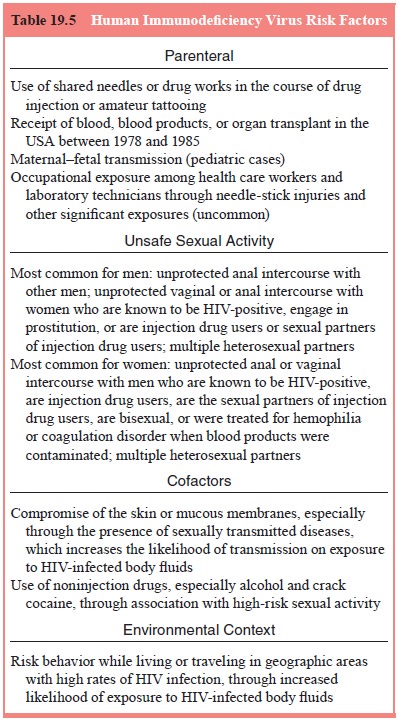
Pregnancy Testing
The serologic test for the presence of human chorionic gonado-tropin b-subunit may assist in ruling out pregnancy before the initiation of therapy with lithium, benzodiazepines, or other medications associated with fetal malformations. It is advisable to perform pregnancy testing for all women of childbearing age before initiating therapy with any psychotropic medication
Urine Testing
Urine testing is indicated in two situations. Urine
tests for preg-nancy are often indicated in the emergency room setting in which
an immediate result is required before the initiation of drug ther-apy.
Urinalysis may be indicated for geriatric patients with new onset of central
nervous system dysfunction or psychosis because urinary tract infections may
manifest themselves in this manner in the elderly.
Cerebrospinal Fluid Evaluation
Lumbar puncture may be indicated to test for
infections, includ-ing meningitis, neurosyphilis, toxoplasmosis and
cerebrospinal fluid tuberculosis. It is indicated in the evaluation of patients
with symptoms such as confusion, disorientation, decreased alert-ness, or
dementia when accompanied by fever (Table 19.15). It is also an important part
of the evaluation of patients who have new-onset seizures or who are suspected
of having neuroleptic malignant syndrome because these symptoms may be caused
by central nervous system infections. In cases in which increased cerebrospinal
fluid pressure is suspected, lumbar puncture should be preceded by computed
tomographic (CT) scanning to evaluate for mass lesions.
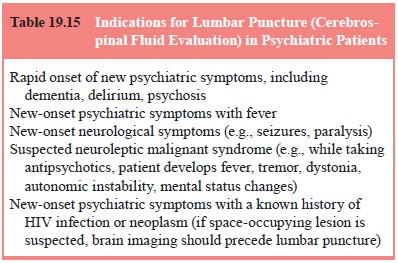
Electrocardiogram
Because it is important to screen for conduction
disturbances and cardiac arrhythmias before beginning therapy with tricyclic
antidepressants, an electrocardiogram should precede the ini-tiation of
therapy. An electrocardiogram is also indicated before beginning certain other
psychotropic medications that may pro-duce electrocardiographic changes (Tables
19.16 and 19.17). An
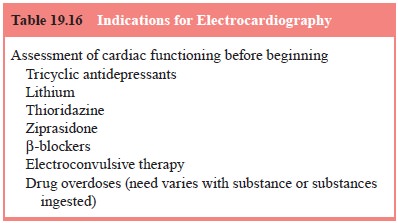
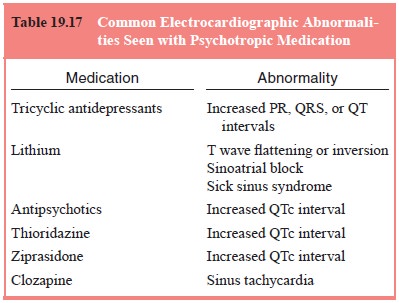
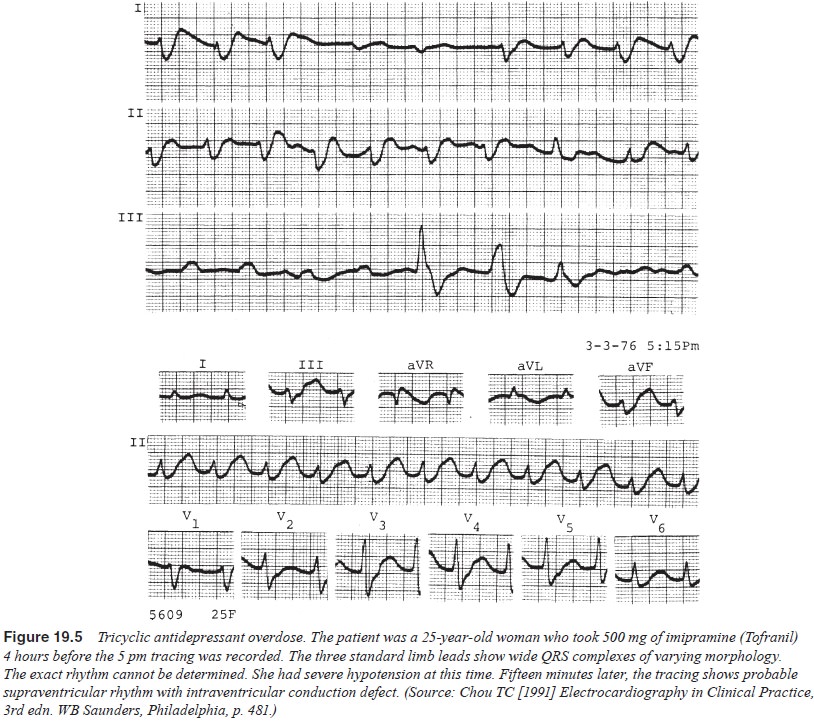
electrocardiographic tracing of a patient who took
an overdose of tricyclic antidepressants is shown in Figure 19.5.
Electroencephalography
A history of brain injury or head trauma is an
indication for an electroencephalogram (EEG) in the work-up of mental sta-tus
changes or psychiatric symptoms. The patient with new-on-set psychosis should
also have an EEG because partial complex seizures may produce psychosis.
Symptoms suggesting tempo-ral lobe epilepsy (Figure 19.6), such as
hyperreligiosity, hypo-sexuality and hypergraphia, also indicate that an EEG
should be obtained, including nasopharyngeal leads, to best evaluate
elec-trical activity in the temporal lobes. EEGs may be useful in the
assessment of insomnia and other sleep disturbances.
Abrupt onset of psychiatric symptoms such as
psychosis, mania, or personality change, or the presence of visual, olfactory
and tactile hallucinations suggest central nervous system dysfunc-tion, which
may warrant evaluation by electroencephalography.
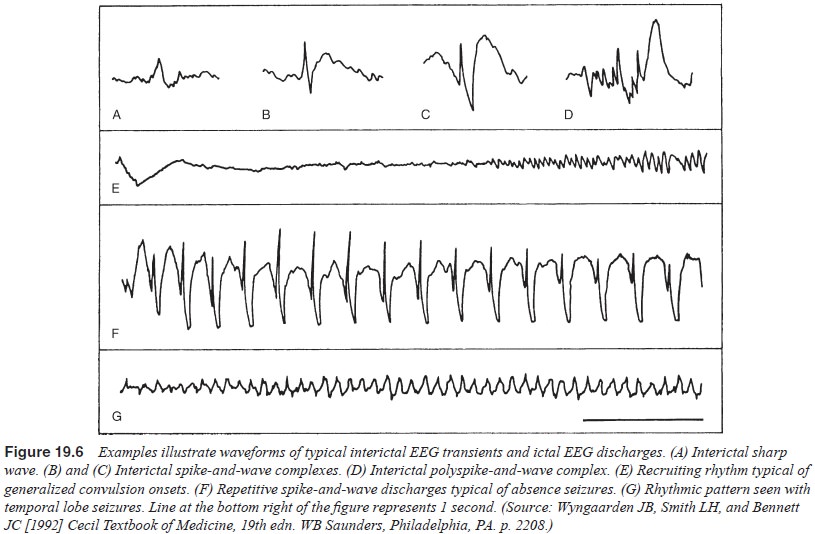
Related Topics